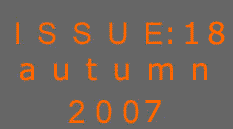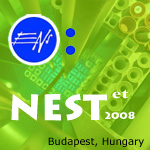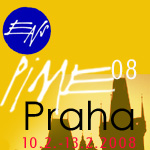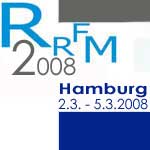
Word from the President

As those of you who attended ENC 2007 (from 16-20
September 2007) already know the conference was co- chaired by
ENS President Frank Deconinck and Marcel Maris, Chairman of the
Belgian Nuclear Society. In their joint welcoming address the
chairmen highlighted the main structure, themes and objectives
behind the extensive ENC 2007 programme, underlined the great
work carried out in support of the conference by its sponsors
and co-organisers, as well as by the numerous exhibitors that
contributed to the impressive industry and research exhibitions.
Above all the chairmen emphasised the special ethos of this the
latest edition of what is a major event on the international
nuclear research agenda - to share new knowledge and experience,
to focus on solutions and to seek to promote innovative, cutting
edge and multidisciplinary research that will provide positive
results for industry and for society as a whole. The ENC
2007 message Inspire yourself …and others says it all.
Here is the welcoming address delivered by Frank
and Marcel. 
Distinguished guests, ladies and gentlemen
We would like to welcome you wholeheartedly to Nuclear Conference
2007 conference and hope that by attending this 3-day conference
you will indeed inspire and be inspired.
This European Nuclear Conference has been created to provide
an increased focus on research, while at the same time calling
our attention to the broader context in which, we think, the
nuclear world should be seen.
The Programme Committee,
which we would like to thank for the superb job that it has
done, has put together a programme based
on three central parallel tracks: "New reactor & energy
technologies", "Fuel cycle and nuclear operations" and,
last but not least, "Medical nuclear applications".
In the “New reactor and energy technologies” track
the topics under discussion include advanced reactors, Generation
IV reactors, an update on future concepts, countries' perspectives
on nuclear energy policy and future projects and research reactors.
They cover a range of subjects which take us from today’s
feasible and improved designs, tools and technologies to a glimpse
of what current developments will lead us to. In addition, 3
countries will present their individual views on nuclear energy
policy. Finally, the presentations on “Plant life extension” and “Maintenance
and operation” will address various aspects that are of
fundamental importance to today’s plant operators.
The “Fuel cycle and operations” track
will focus first on reprocessing, before turning its attention
to advanced
fuel designs and applications, core design and protection. It
will conclude with new developments in fuel technology. After
a session on decommissioning, there will be a number of sessions
addressing various interesting aspects in the areas of waste
and transport.
This year, we added a track on medical applications in ENC to
emphasise the important role played by applications of nuclear
science in diagnosis and therapy. As the subject is not a traditional
ENC one we have invited some world-renowned experts to talk about
radio-labelling and imaging technology, clinical applications
and radioprotection.
It certainly is not our intention to compete with our scientific
sister societies in the field. Instead, we want to create links
between ENS and our sister societies, and inform our respective
members about the exciting developments in adjacent fields of
research and development. Too many researchers and industrialists
working in nuclear energy are unaware of the developments in
nuclear imaging, radio-labelling, radiotherapy etc... Vice-versa,
the medical community may not always be aware of the most recent
techniques or advances in isotope production and radiochemistry,
radiobiology or radioecology. We hope that this conference will
trigger a better understanding and increased collaboration between
both.
The subjects of the plenary keynote presentation and debate
sessions illustrate the broader context fairly well.
Today, Monday, these sessions will address:
-
The EU research
policy
-
The politics of science and technology
-
Business’ and industries’ view on science and R&D
policy, challenges and needs
-
Science as “living knowledge”:
Education and training policy and knowledge management
Tomorrow you will be able to learn more about
the following subjects:
“
The human factor in risk governance: aspects of awareness and
responsibility,” “The benefits, costs and hurts of
nuclear medicine” and “Social awareness." These
sessions will not just be about receiving and processing the
latest information – there will also be a strong
emphasis on participation.
On Wednesday, the last session will address
state-of-the-art European research policy
in the field of nuclear
and medical science and technology and
science and society
issues. It will
include contributions on “Educational activities in the
EMIL network: the Orsay technological and training platform for
small nuclear imaging” and on “Research:
a sine qua non for the nuclear sector.”
A
programme of separate topical workshops is also offered to
delegates and you
are, of course,
invited
to participate in
the workshops that deal with the subjects
that interest you most.
We are very happy to see that the ENS Young Generation (YG) is
also organising its own workshops. In
addition, it will present a briefing on the presentations made
in each of the 3 research
tracks at the end of the conference.
Finally we would like to invite you to
attend the plenary panel debate entitled: “Science and Society”,
where we will have the honour of welcoming
the Rector of the VUB - Prof.
B. Van Camp and Maria-Laura Franciosi,
an experienced journalist.

We are particularly grateful to our
diamond sponsor, Suez, who has indeed
a considerable
vested interest
in nuclear
energy today – which
will probably be even greater in the
future.
We would also like to thank our Gold
sponsor, AREVA, which is recognised
worldwide as a major player in
the field of nuclear
energy.
Our special thanks also go to the
American Nuclear Society (ANS)
and the Belgian
Nuclear Society (BNS), as well
as to the IAEA
and the OECD/NEA, who have all
given their invaluable support
to ENC 2007.
Finally, a great vote of thanks
goes to the Vrije Universiteit
Brussel,
who agreed to host this conference
on its
campus.
We hope that you will indeed
find great inspiration from
attending the presentations,
by visiting
the research
exhibition, the
science café and the industry
exhibition and by having a look at the
poster gallery.
It is now our privilege to kick off ENC
2007 by introducing the
first group of keynote speakers, who will address
the
subject
of current and future EU
research policy:
-
Mr.
Roland Schenkel, DG at the Joint Research Centre of the
EC, at Petten,
-
Mr. Fernandez-Ruiz, Director of Directorate
J, Energy-Euratom, in the Directorate General “Research” of
the EC and
-
Mrs. Maria Isabella Detand, who represents the Belgian Minister
of Economy, Energy,
Foreign Trade and Science Policy, Marc Verwilghen
Thank you very much gentlemen
for taking part in ENC 2007 – your
presence
is greatly appreciated. The floor is yours.
Thank you.
|








